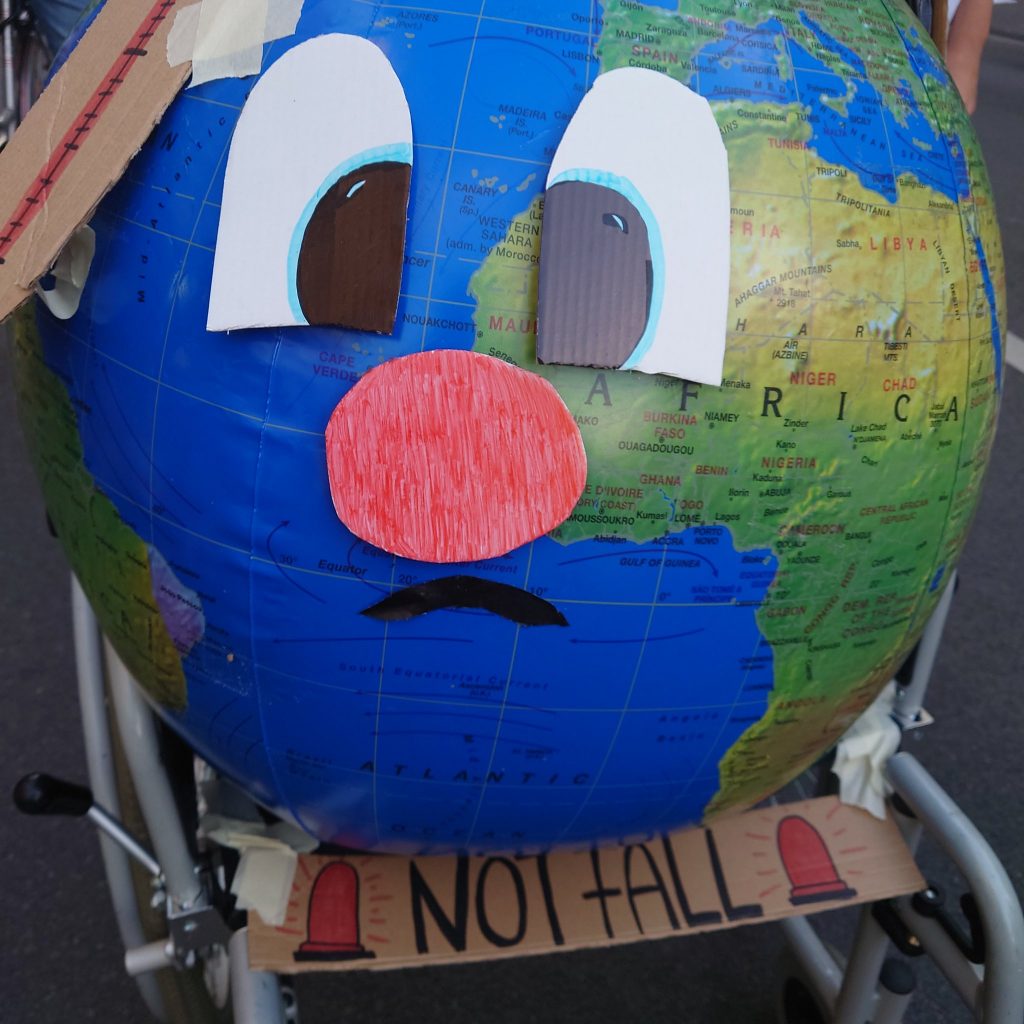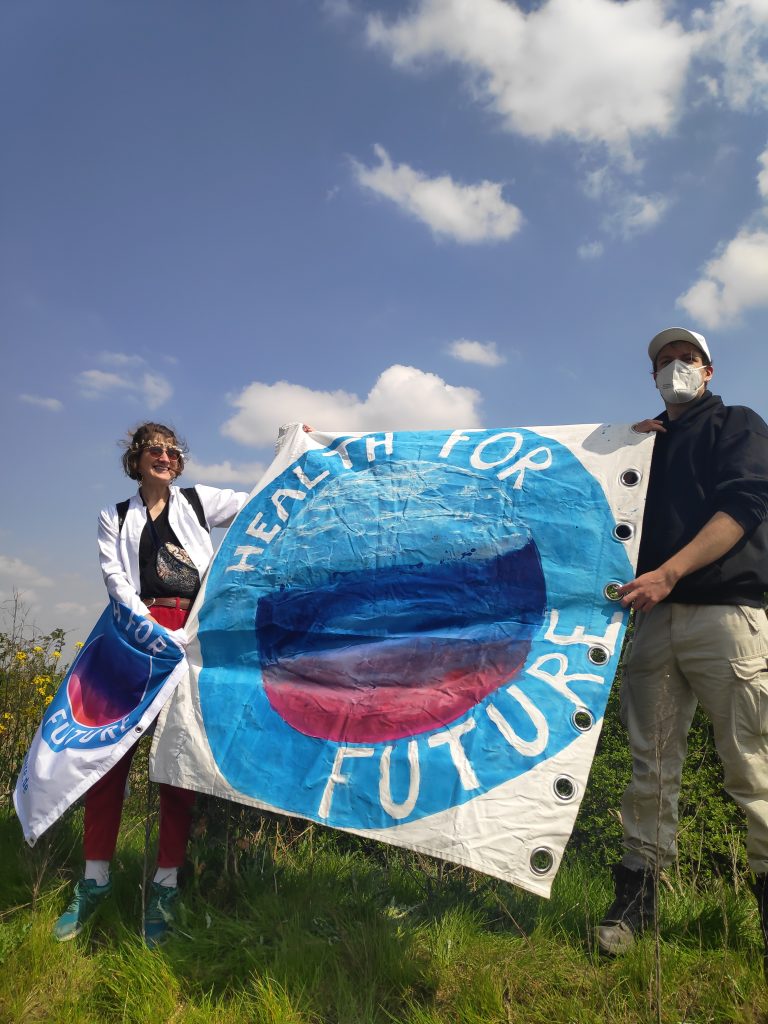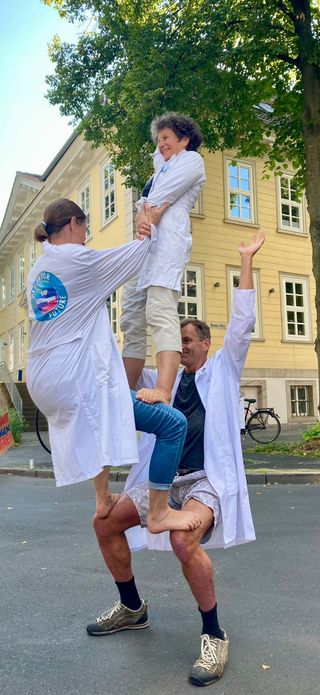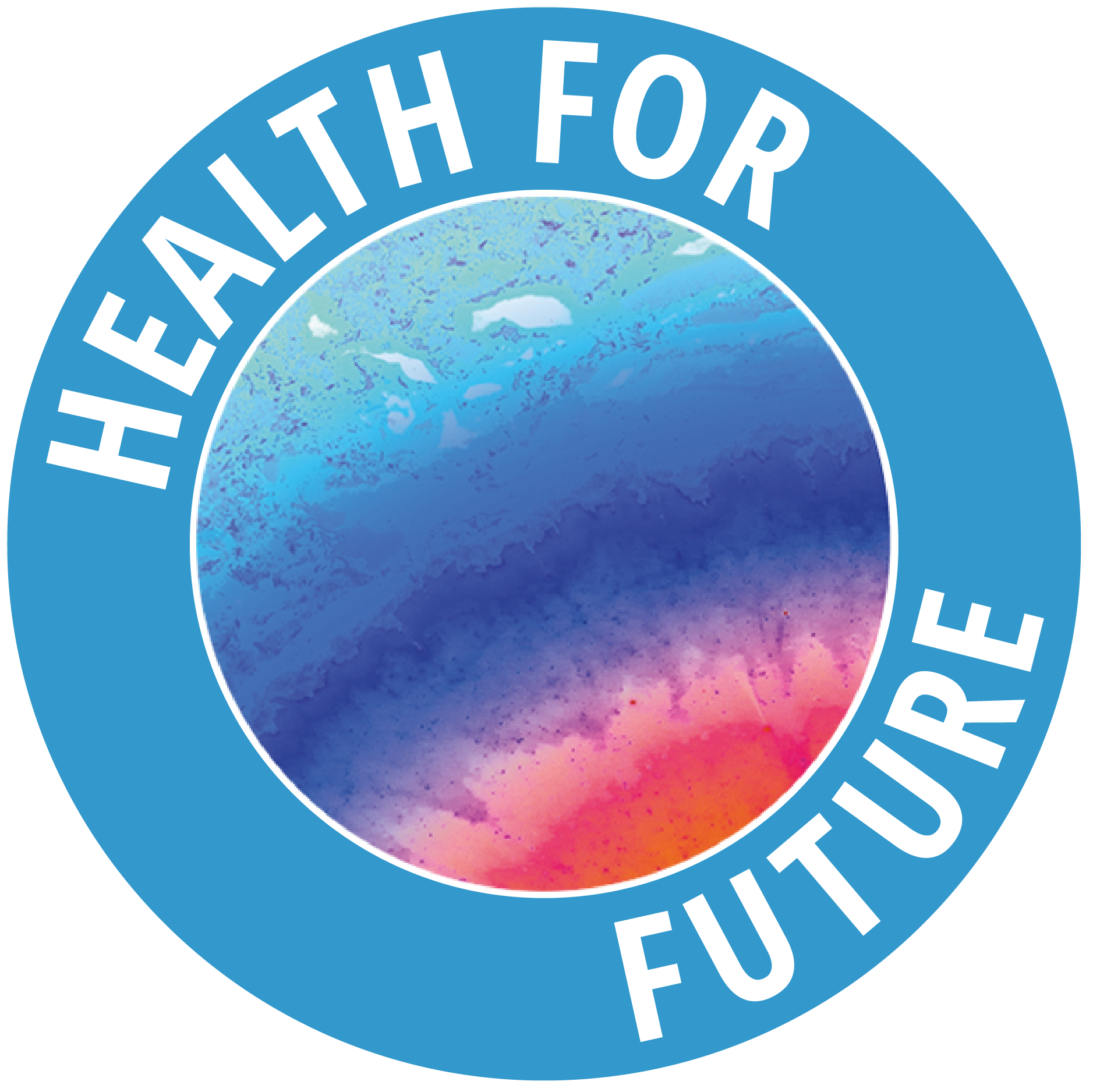„Climate change is the greatest global health threat of the 21st century“
The Lancet, Horton, 2009, 1869-1870

Health for Future
The health toll from future climate impacts, both in terms of physical and mental health, is inestimable. A below 2°C trajectory and resilient, net zero health systems are vital to saveguard health and planet!
Health for Future emerged as a social movement of health professionals, brought together by a vision of planetary health and climate justice. We are pioneering change within health systems through networking, education, direct actions and advocacy.
Health for Furture was founded in August 2019 as a movement and action forum. Health for Future was initiated by the German Climate Change and Health Alliance (KLUG e.V.).
The Health for Future movement unites all people in the health system.


H4F addresses the climate crisis which is increasingly being described as a health emergency.
Heat waves and other extreme weather events, increasing food insecurity, altered patterns of infectious diseases and animal vectors, and many other direct and indirect effects of the climate crisis threaten both our physical and our mental health. Health systems around the world experience an increasing strain on their resources due to climate change. Many lives have already been lost.
But the health sector is not only suffering the consequences of climate change, it is also contributing substantially to greenhouse gas emissions. If the health care sector were a country, it would be the fifth-largest emitter of greenhouse gas emissions worldwide.
Without a sustainability transformation of the health care sector in Europe and beyond, we will not be able to prevent dangerous levels of climate change. This makes it imperative that the health care sector drastically changes its ways of functioning, especially with regard to the deployment of energy and natural resources. While this constitutes a paramount challenge, it also provides for opportunities to create more resilient and equal health care.
Get involved
We invite you to start an international Health for Future group in your region or join us.
We believe in the power of movements and love to get to know about your perspectives. If you want to know more about us, our experiences or if you are interested in cooperation, contact us:
- Main contact: kontakt@healthforfuture.de
- Austria: oesterreich@healthforfuture.at
- Belgium: contact@healthforfuture.be
- Switzerland: info@healthforfuture.ch

How does climate change affect human health?
Climate crisis and environmental pollution are already directly and indirectly impacting our health. Effects of the climate crisis are rising temperatures, sea level rise and increased occurrence of extreme weather events. These changes create restrictions and dangers for our health. (Read more here.)
- Extreme weather events lead to injuries and deaths, have negative effects on mental health, destroy livelihoods and force people to leave their homes.
- Heat periods lead to heat stress, illness and death.
- Air pollution worsens asthma and other respiratory diseases, increases the incidence of respiratory allergies and causes development as well as worsening of cardiovascular diseases and lung cancer.
- Insecure water quality and quantity lead to increased incidence of waterborne pathogens such as campylobacter, cholera and cryptosporidiosis.
- Insecure Food supply and food security makes malnutrition and the incidence of foodborne as well as and mycotoxin diseases increase.
- Increased occurrence of vector-based disease outbreaks such as chikungunya, dengue, malaria or encephalitides (e.g. TBE).
- Wildfires lead to injury and death, affect mental health and destroy livelihoods.
Climate protection is health protection put into action. (Haines, 2017)
Co-benefits
When protecting our climate, we automatically take advantage for our health.
We call this phenomenon ‚health co-benefits‘. Our health benefits from environmentally conscious and climate-protecting behaviour. Examples include cycling which leads to increased physical activity and plant-based nutrition which can serve as long-term vascular prevention.
Healthier cities, better nutrition, active mobility, cleaner air. These positive visions of our future can help to promote the health of all people.
- Example, ‚Bicycle instead of car‚: In their everyday mobility, especially city dwellers have the opportunity to protect climate and their health at the same time. According to the Federal Environment Agency (Umwelt-Bundesamt), regular cycling increases life expectancy by 3–14 months. In contrast, the associated risks of increased exposure to particulate matter and accidents are negligible. In addition, according to the University of Utrecht, cycling has a positive influence on our mental health and cyclists have the most positive image of their commute (Wild, Woodward, 2019).
- Example, planetary health diet: Livestock is responsible for 83% of land use and 60% of greenhouse gas emissions within agriculture. At the same time, a meat-reduced diet has positive health effects through lowering BMI, cholesterol levels, blood pressure and HbA1c (glycated haemoglobin). These factors lead to a risk reduction of 30% for heart attack on a vegetarian diet. However, not only meat, but animal products in general (especially butter and cheese) are linked to immense emissions. Switching to a plant-based diet protects not only our environment, but also ourselves (Crowe, Appleby, Travis, Key, 2013).

We are part of the change – our actions
We are experimenting with strategic actions as ‚change agents‘ aiming towards transformative action in several fields.
Demonstrations and vigils: The For Future movement and especially the climate strikes of Fridays for Future have been the driving force of an increasing social pressure for more climate justice in recent years. We are also present at climate strikes and organize demonstrations and vigils ourselves.
Politics: We engage in political agenda-setting, discuss with members of parliament and contribute to the shaping of the general socio-political opinion. In 2021, Health for Future Germany will participate in the electoral process at both state and federal level and try to bring climate and health protection into the public’s focus.
Education: Trainees and students pursue the objective to integrate the topics of „Planetary Health“ and the connections between climate change and health as a fundamental part of the education at their universities and educational institutions. In summer 2020, the German Climate Change and Health Alliance (KLUG e.V.) set up the first Planetary Health Academy lecture series. The Planetary Health Academy is a free online lecture series focussing on transformative action in addition to scientific foundations and transdisciplinary perspectives on Planetary Health. In average, about 1000 people attended each lecture. Health for Future activists contributed some of the content to the lectures, inspiring other trainees and health professionals to start new Health for Future local groups. The lecture series is recognized as an elective at various universities, for example in Aachen and Freiburg.
Healthcare sector: Health professionals work towards CO2 neutrality. They integrate findings on the health effects of climate crisis into patient care.
The decentralized organization and independence of the individual Health for Future local groups make it possible to plan and implement many different projects and actions.
Lancet Countdown
Tracking the connections between public health and climate change
Cape Toolkit
Climate Change Toolkit for Health Professionals!
Planetary Health Alliance
A consortium of more than 380 universities, non-governmental organizations, research institutes, and government entities from around the world committed to understanding and addressing global environmental change and its health impacts.
